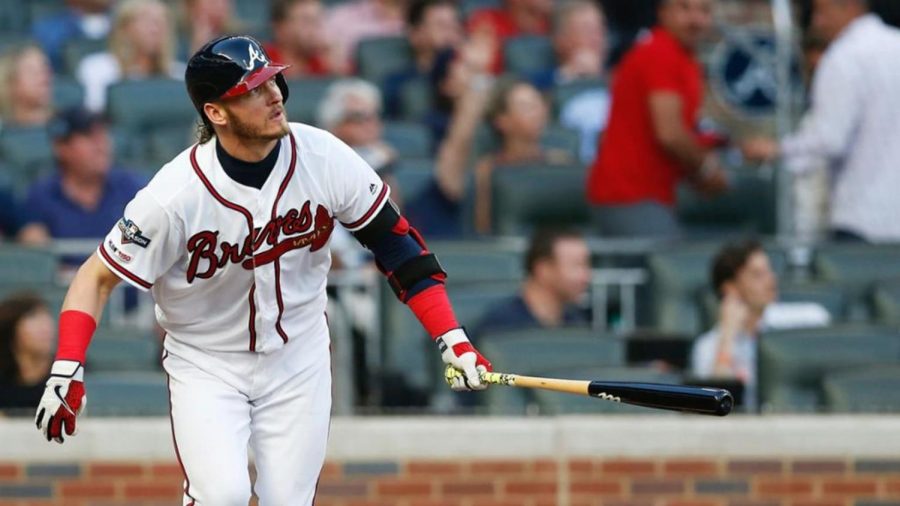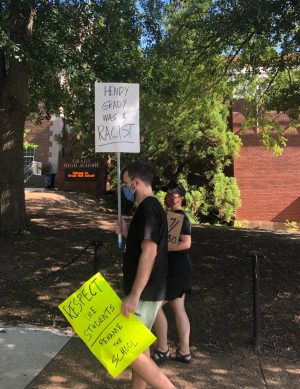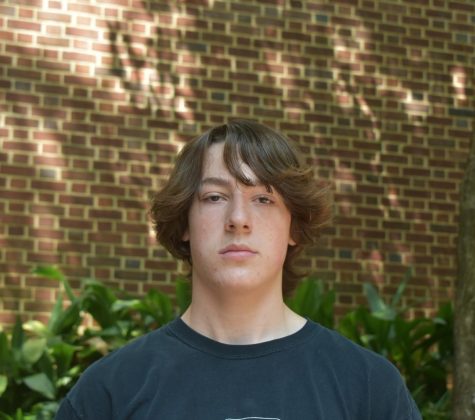Atlanta Braves should consider a name change
TOMAHAWK CHOP: One of the Braves’ trademarks is the symbol of the tomahawk, which appears on their jerseys in the picture above, and use of the tomahawk chop as a cheer. However, some members of the Native American community feel disrespected by the imagery, and the Braves have even been called out by players of opposing teams who identify as Native American.
September 23, 2020
Name changes have become a thing of the present. From sports teams, such as the Washington Redskins, to street names, like the former Confederate Avenue in Grant Park, to high schools, including Grady, the abandonment of racially insensitive names of public entities has become more and more common.
One entity, however, still clings to its name: the Atlanta Braves.
As the team clinches the NL East for the third year in a row, coupled with the recent name changes of two major professional sports teams — the Washington Redskins and the Cleveland Indians, both of which share names and mascots that degrade Native American culture — the spotlight on the Braves has rarely been brighter. However, despite pressure to do so, the Braves organization has not made a move to change its name. In fact, the Braves have said, “We will always be the Atlanta Braves,” in a letter to season ticket holders, according to the Associated Press.
The name originated when James Gaffney bought the franchise in 1912 and used the emblem of his political party — an Indian headdress — as the team’s logo, a common example of cultural appropriation. Later, Gaffney gave the name “Braves” to the team, a term for a Native American warrior. Although it may not seem that the name “Braves” is necessarily racially insensitive in itself, the word encompasses two fundamental problems.
The first is where the term came from and its original use. “Brave,” as it’s used to describe Native Americans, originates from the Spanish word bravo (courageous, untamed, savage), which originates from the Latin word barbarous (barbarous). The word gained popularity in the late 15th century, around the time Columbus arrived in the Americas and first interacted with the Native Americans. In essence, it promotes the ethnocentric views that Europeans held toward Native Americans by describing them as barbarous and savage.
The second major issue with the title “Braves” is its caricature-like depiction of Native Americans. Similar to the Redskins and the Indians, the Braves’ name and the image is based on the popular image of Native people that was fed to Americans through pop-culture, such as Hollywood-produced westerns and TV shows.
However, this image of a so-called “Redman” is a complete cultural appropriated myth, something akin to the offensive “Mammy” stereotype of African-American women depicted during Jim Crow era movies of American slavery and plantation culture. The imagery is so far removed from the majority of Native culture that it’s hard to see it as anything other than a degrading stereotype.
The caricature-like depiction also spreads through one of the team’s most famous celebrations: the tomahawk chop. Just last year, St. Louis Cardinals’ rookie Ryan Helsley, who is a member of the Cherokee Nation, called out the Braves for their use of the chop. Helsley was quoted as calling the chop “a misrepresentation of the Cherokee people or Native Americans in general,” claiming that, “it devalues [Native Americans] and how [they’re] perceived.”
Simply put, the title “Braves” and the team’s branding as a whole extends historically racially-charged imagery of Native Americans, depicting them as violent and barbarous. Although the team got rid of its mascot “Chief-Noc-A-Homa” in 1985, more has to be done. The bottom line is that as long as any controversy related to a racially-insensitive team name remains, and as long some feel offended by the name, the franchise should strongly consider a change.









Terri Holbrook • Nov 4, 2021 at 6:11 am
Well done, Duncan!
Regina Appleby • Feb 7, 2021 at 9:27 pm
They should absolutely change their name and get rid of the tomahawk chop. This name degrades all Native Americans. Why would any team as popular as the braves not step up and set an example of what being brave really means? They would gain the respect of a nation. They should be ashamed that their brand is offensive to so many Americans!
Andres Lewis • Sep 24, 2020 at 1:35 pm
This is a well thought out article, though I think that you are wrong. This is a team that’s name might have once been based with racist intent, but now that’s the last thing it is. When I think of the Atlanta Braves, I think of the players and the team. I don’t care much about the team name because that’s not what defines a team. I also think that the Braves organization has gone to great lengths to not insult Native American culture. They’ve discussed removing the chop(which I think the shouldn’t do), and they’ve gotten rid of their insulting mascots. If anything, the Braves have been very inclusive. I have a few general rules as to politics. You never talk about it with friends, with guests, and with sports. Sports shouldn’t be politicized. Sports are a place to relax and get rid of the life worries that might plague you. That moment of relaxation is ruined when you start politicizing sports. Just like the national anthem kneel. It’s ok to protest and tell people what you believe in, but sports is one of the only places that still unifies us . Sports is a place where you can be the complete opposite of somebody, and still cheer for the same thing. Politics divides us, and it shouldn’t divide us in sports. I understand that a few people are insulted by the chop and the name, but if I saw my culture being represented I’d be proud. I’d be proud that people recognized my people as warriors. Nobody gets mad about the New England Patriots because they’re proud that they’re being represented. I think we need sports to unify us, not divide us. We can’t go around saying everything is offensive because that causes more division, and in a country where we’re already being divided, we cannot allow that to happen. Please send your thoughts on what I said. I’d love to hear your opinion.